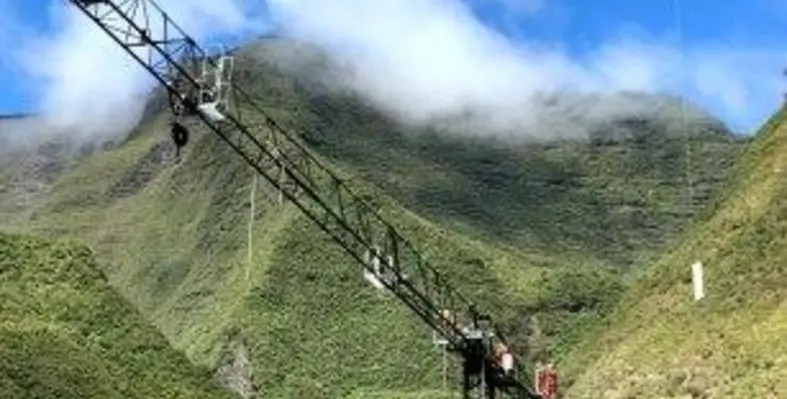Manitowoc dealer GLI has erected a Potain MCT 58 tower crane using a helicopter on the island of La Réunion in the Indian Ocean
The MCT 58 was purchased to replace an old Potain 427 E that was manufactured in the 1970s and installed in the 1990s on a hydroelectric dam over the Rivière de l'Est at the EDF Sainte-Rose power station in La Prise d’eau des Orgues.
EDF (Électricité de France) required the crane to help dismantle the old crane and carry out general maintenance on the dam. Because of the dam’s remote location at the foot of the Piton de la Fournaise volcano — one of the most active in the world — the crane components could not be transported by road. The only road access is a narrow tunnel suitable only for small city cars.
“It was a tough specification, which cranes from other brands would not have been able to meet because of the weight limitation on the helicopter. We collaborated closely with Manitowoc to adjust the capacity, technology, warranty and erection plan to meet EDF’s needs and our experience assured them that we could complete the task safely,” said Christophe Chappaz, technical director at GLI, who was in charge of the project.
An extra support was added to place the hoisting winch on the side of the jib, and the counter jib was supplied in three parts. Manitowoc also devised a special lifting plan to ensure the erection could proceed with all elements weighing under one tonne.
“Usually, it would take around four hours to erect an MCT 58. We took a total of six and a half hours across two days due to the difficulty of using a helicopter. The rotor blades induce a swirling wind, which is difficult to manage, so it was important we took things slowly and steadily. You cannot rush when safety is critical,” Chappaz said.
The crane is secured using static fixing angles and reaches a height under hook of 19.7m with 30m of jib. The maximum load is 3t at 20.7m and 1.96t at 30m. There is no cab; the crane is operated by radio remote control instead.
The hydroelectric power station collects the rainwater that falls on the slopes of the Piton de la Fournaise volcano and funnels it through a 4km supply galley into four, 25,000 m3 tanks. The topography does not allow for a dam reservoir. Hence, the tanks are emptied twice a day through four turbines 870m below to generate 22MW of power.














